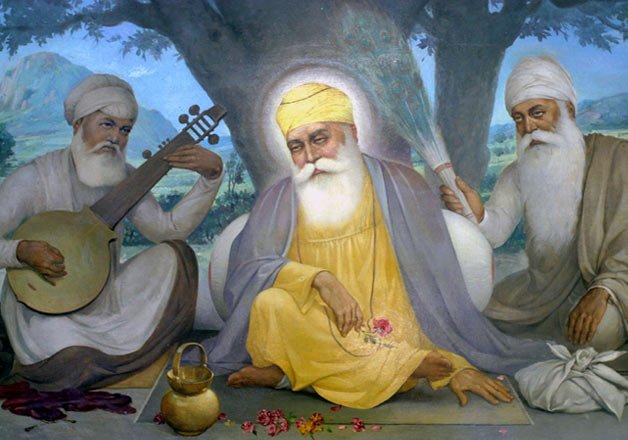Your cart is currently empty!
Gurpurab
Waheguru Ji Ka Khalsa…Waheguru Ji Ki Fateh

Guru Nanak: The Founder of Sikhism and the Champion of Universal Equality
Guru Nanak Dev Ji, the first Guru of Sikhism, is one of the most revered spiritual leaders in the world. Born in 1469 in the village of Nankana Sahib (present-day Pakistan), Guru Nanak's teachings transcended geographical, cultural, and religious boundaries, shaping the foundation of one of the major world religions—Sikhism. His life and teachings continue to inspire millions, emphasizing principles of equality, justice, service, and devotion to God.
Early Life and Spiritual Awakening
Guru Nanak was born into a Hindu family in a time of religious division and social inequality in South Asia. The region was deeply entrenched in the rigid caste system, and both Hinduism and Islam dominated the spiritual landscape. Nanak’s early life was marked by a sense of inquiry and a deep desire to understand the meaning of life and the nature of the Divine.
From a young age, Nanak exhibited a keen intellect and an intuitive spiritual awareness. His parents, recognizing his potential, encouraged his education, and he quickly mastered the sacred texts of both Hinduism and Islam. However, it was a pivotal moment in his life when, at the age of 30, he experienced a profound spiritual awakening.
One day, while bathing in the river, Guru Nanak disappeared for three days. Upon returning, he proclaimed, "There is no Hindu, there is no Muslim." This statement marked the beginning of his mission to preach a universal message of unity, transcending religious divisions. Guru Nanak's vision of God was inclusive and non-sectarian, rejecting ritualistic practices and dogma in favor of a personal relationship with the Divine.
Guru Nanak’s Teachings: A Call for Equality and Justice
Guru Nanak’s teachings are encapsulated in the concept of "Ik Onkar", which means "There is only one God." This foundational belief is central to Sikhism and underlines the unity of God, who is beyond all forms and names. For Guru Nanak, God is formless, eternal, and present in all of creation.
Nanak's emphasis on one God laid the groundwork for a radically egalitarian approach to religion. His message was not just for those who followed him but for all of humanity. He sought to break the shackles of social divisions and hierarchical structures that divided people along lines of caste, religion, and race.
Guru Nanak’s teachings revolved around three key principles:
1. Naam Japna (Simran): The practice of remembering God through meditation on His Name. For Nanak, the ultimate goal of human life was to remain in constant remembrance of God, cultivating a deep, personal connection with the Divine.
2. Kirat Karni (Honest Living): Guru Nanak emphasized living a life of honesty and integrity. He advocated for earning a living through honest means and providing for oneself and one's family without exploitation or deceit. He condemned the exploitation of others, including the rich and powerful who took advantage of the poor.
3. Vand Chakna (Selfless Service and Sharing): Guru Nanak's principle of sharing and selfless service, often referred to as "Seva", was a radical departure from the social norms of his time. He taught that one should not only work for personal gain but should share the fruits of labor with the less fortunate. This concept is embodied in the practice of "Langar", the community kitchen in Sikh Gurdwaras (temples), where free meals are served to all, regardless of caste, religion, or background.
The Role of Guru Nanak in Social Reform
Guru Nanak was a vocal critic of the rigid caste system, which dictated social and economic inequality. He rejected the idea that anyone could be considered superior or inferior based on their birth or social status. He argued that all people, regardless of caste, were equal in the eyes of God and should be treated with dignity and respect.
Nanak also critiqued the religious practices of his time. He was critical of both Hindu rituals and Islamic dogmas that he felt were empty and focused more on outward ceremonies than on inner spirituality. Instead, he advocated for simplicity, direct devotion to God, and the cultivation of virtues like humility, compassion, and love.
Moreover, Guru Nanak emphasized the importance of women, who were often treated as inferior in his time. He taught that women, like men, are equal in the eyes of God and should not be oppressed or marginalized. His messages on gender equality were revolutionary and remain a cornerstone of Sikhism today.
The Legacy of Guru Nanak
Guru Nanak’s influence extended far beyond his own time. After his passing in 1539, his teachings were carried forward by the nine other Sikh Gurus, each of whom built upon his vision of a just, egalitarian society centered around devotion to the One God. The Guru Granth Sahib, the holy scripture of Sikhism, compiled by Guru Arjan (the fifth Guru), contains the hymns of Guru Nanak along with those of other Sikh Gurus and spiritual leaders from various traditions, further emphasizing the inclusivity of his teachings.
Guru Nanak’s legacy continues to inspire millions of Sikhs around the world today. His commitment to social justice, equality, and the belief in one universal God resonates with people of all faiths and backgrounds. In the contemporary world, where divisions and inequalities still persist, the teachings of Guru Nanak offer a path to peace, tolerance, and unity.
Conclusion
Guru Nanak Dev Ji was not just a spiritual leader, but a social reformer and visionary who sought to break the boundaries that divide humanity. His message of equality, justice, and devotion to one universal God remains as relevant today as it was over 500 years ago. Through his teachings, he established the foundation for Sikhism, a religion that continues to promote values of selflessness, service, and respect for all people, regardless of their background or beliefs.
As the world grapples with challenges of division and inequality, the timeless wisdom of Guru Nanak offers a beacon of hope—a reminder of our shared humanity and our collective responsibility to live in harmony with each other and with the Divine.

